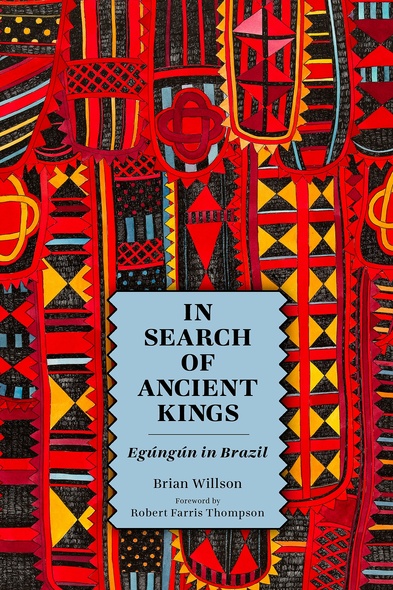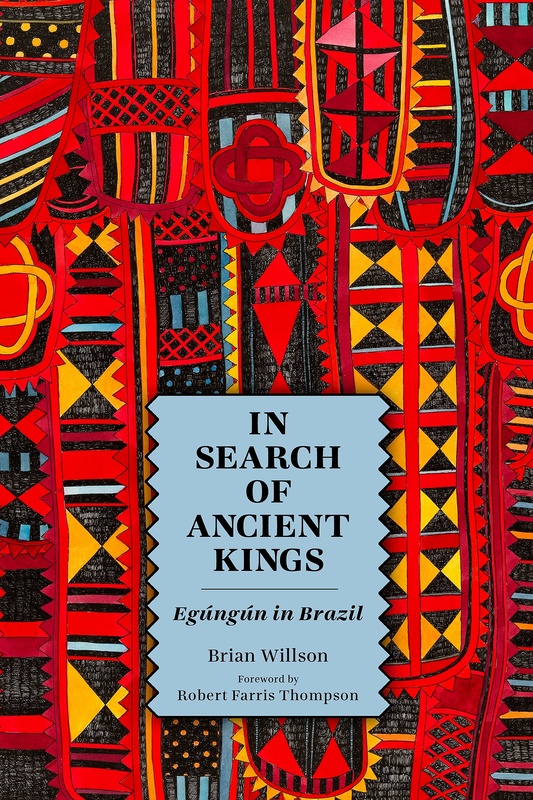
In Search of Ancient Kings
Egúngún in Brazil
The Egúngún society is one of the least-studied and written-about aspects of African diasporic spiritual traditions. It is the society of the ancestors, the society of the dead. Its primary function is to facilitate all aspects of ancestor veneration. Though it is fundamental to Yorùbá culture and the Ifá/Òrìṣà tradition of the Yorùbá, it did not survive intact in Cuba or the US during the forced migration of the Yorùbá in the Middle Passage. Taking hold only in Brazil, the Egúngún cult has thrived since the early 1800s on the small island of Itaparica, across the Bay of All Saints from Salvador, Bahia. Existing almost exclusively on this tiny island until the 1970s (migrating to Rio de Janeiro and, eventually, Recife), this ancient cult was preserved by a handful of families and flourished in a strict, orthodox manner.
Brian Willson spent ten years in close contact with this lineage at the Candomble temple Xango Cá Te Espero in Rio de Janeiro and was eventually initiated as a priest of Egúngún. Representing the culmination of his personal involvement, interviews, research, and numerous visits to Brazil, this book relates the story of Egúngún from an insider’s view. Very little has been written about the cult of Egúngún, and almost exclusively what is written in English is based on research conducted in Africa and falls into the category of descriptive and historical observations. Part personal journal, part metaphysical mystery, part scholarly work, and part field research, In Search of Ancient Kings illuminates the nature of Egúngún as it is practiced in Brazil.
Brian Willson narrates the sensory and psychological experience of his initiation into Egúngún, the cult of the ancestors. This stunning cultural history of an African-derived practice in Brazil blends reports of dreams and trance states with a travel journal and a memoir of his initiation mother in the USA. Willson’s participant-observer ethnography reconstructs how traditions of Ọ̀yọ́ people of West Africa were renewed in Brazil generations ago and continue to grow in ritual lineages today.
Brian Willson’s fascinating ethnography of Egúngún tradition in Brazil—the ancestors who are in the spirit realm but manifest themselves among the living—provides an in-depth case study and account of how the ancestral traditions travel from their place of origin in southwest Nigeria to the Diaspora, particularly in Brazil. In many ways, this book engages important conceptual realities and theories of African diasporic religions, such as gender dynamics, multiple belonging and identities, and the interrelationship of the spiritual, intellectual, and epistemological quests and language transformation in space and time. By offering this richly detailed narrative of the landscape of Egúngún in Brazil, Willson shows us how ethnography can be pursued through the lens of personal journey and pilgrimage in the knowledge and experience of a tradition. This beautifully written work will be useful to scholars, ordinary readers, and devotees of Yorùbá Òrìṣà traditions all over the world.
Brian Willson’s In Search of Ancient Kings: Egúngún in Brazil provides a rare and valuable look into the geography of a profoundly important but little-known space in the Black Atlantic religious cosmos, the transplanted Yorùbá-based cult of ancestor veneration found within the Afro-Brazilian religion of Candomblé. Through the diaristic presentation of his experience of Candomblé initiation and ancestor veneration, as well as some impressive photographs, Willson conveys an intimate and immediate portrait of the world of the terreiro as a liminal zone where the living and the dead meet each other in ritual and in casual informal encounters within an otherworldly ambience of deep sacredness and profound joy.Especially valuable is his description of the historical genealogy of the origin and development of Brazilian Egúngún drawn from interviews with prominent religious elders. This account underscores the importance of transnational networks during and after the abolition of slavery, the role of families in the preservation of ancestor veneration, and the determined cultural creativity of specific Afro-Brazilians in a timeline that shows how cultural preservation and cultural creation can be very much the same thing.
Willson’s book is a welcome addition to the literature on Brazilian Candomblé and Black Atlantic religious studies in general.
I found In Search of Ancient Kings utterly fascinating. Musician/scholar Brian Willson takes us on a personal immersion into a world unlike any I’ve ever seen. As a rare American initiate into the brotherhood of the Egúngún society of Brazil (a Yorùbá-based society of ancestor worship), Willson provides a unique and groundbreaking firsthand blend of impeccable research and deeply felt mysticism.
Brian Willson has given us a wonderfully honest, heartfelt account of a spiritual journey in search of Egúngún in Brazil—a quest that illuminates the power and wisdom of Yorùbá faith and the importance of honoring ancestors. It is also a compelling history of that Egúngún tradition in Brazil, flourishing despite the enormous challenges of enslavement and racism. As the author learned from his godmother, you must get close to death in order to know how to live with grace, gratitude, and Asé.
Engaging, well-written, and rigorous, this book makes a major contribution in that it treats a largely undocumented and important topic: ancestor veneration among Yorùbá-descended people of Brazil. Its groundbreaking approach, which attends to the author’s own experiences as an Egúngún initiate while remaining grounded in conventional scholarly perspectives, will appeal to readers in religious studies, anthropology, Africana studies, and Latin American studies, as well as to all members of the general public who are inspired by African-based religions and spirituality, which have so much to teach us about life and death.
Brian Willson is a babaláwo (specialist in the Yorùbá system of Ifá) and a senior member of temple Ilé Òkànràn Onílè based in Ibadan and New York. He has been a practitioner of African diasporic religious practices for over forty years. He received his DMA from City University of New York Graduate Center, has lectured or performed in over twenty-five countries, and is a trustee on the board of Education Africa.




